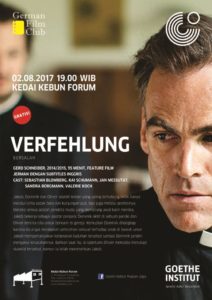

German Film Club
Wednesday, 2 August 2017, 7.00 pm
Auditorium (2nd floor) Kedai Kebun Forum
Jl. Tirtodipuran 3, Yogyakarta
Open for public and free
presents
The Culpable (Verfehlung)
Director: Gerd Schneider, 2014/15, feature film, 95 min., German with English subtitles
Cast: Sebastian Blomberg, Kai Schumann, Jan Messutat, Sandra Borgmann, Valerie Koch
SYNOPSIS
Jakob, Dominik and Oliver are friends, connected to one another not only through their football matches and occasional pub visits, but also through their profession. They are all priests, near the beginning of their careers. Jakob works as a prison chaplain, Dominik is active in a parish and Oliver aspires to a career in the church hierarchy. Then Dominik is arrested on suspicion of having sexually abused minors. Jakob questions the veracity of the allegations – until Dominik himself admits his guilt. Even then, the opportunist Oliver tries to cover up the scandal, but he has underestimated Jakob.
The young priests Jakob, Dominik and Oliver are good friends, play football together and enjoy going to the pub for a beer. As Deputy Vicar General, Oliver has already taken the first step toward a career in the official church hierarchy. Dominik works in a parish and is committed to social work. Jakob probably has the hardest task, as he works as a prison chaplain. Then comes the shock: just as Dominik and Jakob are about to say Mass, the police arrive at the church to arrest Dominik. Allegedly, he has sexually abused minors. Neither Jakob nor Oliver are able or willing to believe in their friend’s guilt, especially as Dominik categorically rejects the allegations.
Dominik is placed in custody. His friends react differently as increasing evidence places his protestations in doubt. Oliver promises that they will get Dominik out of prison. He fears a scandal far more than the truth, which he wants to suppress and cover up at all costs – even with hush money for the victims, if necessary. Jakob wants to find out the truth. He contacts the mother of the alleged victim, but she wants nothing to do with him. By chance, he later discovers that the son of a Croatian immigrant was also abused by Dominik. He asks Oliver: “What if the accusations are true?” Here as well, he’s met with a rebuff. Oliver merely states: “I just want this to end!” He mainly fears it could hurt his career if an inconvenient truth were to come to light. Finally, Dominik explains: “It was basically nothing; it just happened!”
As a “child molester”, Dominik is brutally mistreated by his fellow prisoners. This facilitates his obtaining parole pending trial. The three friends play football again. Jakob is so furious with Dominik that he tackles him after a nasty foul. But this is not the only reason he feels guilty when contemplating the alternatives: a show of mercy or a clear conscience? He seeks help from the Cardinal and is fobbed off with an opportune phrase: “Our task is not to investigate, but to assist and to forgive.” Jakob doesn’t give up. Oliver threatens him: “Think it over well whose side you’re on!” In the end, Jakob hesitates at the door of the prosecutor. His final small movement suggests that he will testify against his friend.
For years, the Catholic Church has been in a deep crisis – and not only in Germany – due to the emergence of numerous, often long-lasting periods of sexual abuse with victims who were predominantly minors. Attempts to suppress uncomfortable truths have only intensified the problems. In January 2016, Georg Ratzinger, brother of Pope Emeritus Benedict XVI, called efforts to investigate abuse cases within the famous Regensburg Cathedral Boys’ Choir “sheer madness”. Author and director Gerd Schneider: “The stance of the Catholic Church in abuse cases has upset me for a long time. About seven years ago, I came up with the idea. (…) A prison chaplain suddenly finds his colleague and good friend arrested. What goes on in his mind? How does their relationship change?What does he do? These are questions that I’m very curious about. I was a seminarian myself and had the firm intention of offering my life to the service of the Catholic Church. Against the backdrop of this profound experience, it was important for me to show that the cover-up is not systematic, even if it has systematic traits. Anxiety, incompetence and anticipatory obedience have created a climate in which these monstrous events are able to take place.”
Gerd Schneider has found a sensitive tone for his production, which keeps it from toppling into lurid effects, even when illustrating the crime itself. None of the three friends is truly innocent; even Jakob is not a flawless hero. This makes THE CULPABLE a subtle film whose topicality, one fears, will continue for some time.
Biography
Gerd Schneider was born in Olpe in 1974. He studied Catholic Theology in Bonn and Vienna. During his studies, he completed several internships, including one at JVA Cologne-Ossendorf Correctional Facility. After receiving his degree, he began studies at the Film Academy Baden-Württemberg. For his graduation film AM RAND DER HOFFNUNG, he received several prizes. THE CULPABLE is his first feature film.
For more info please contact Uniph +6285725809139